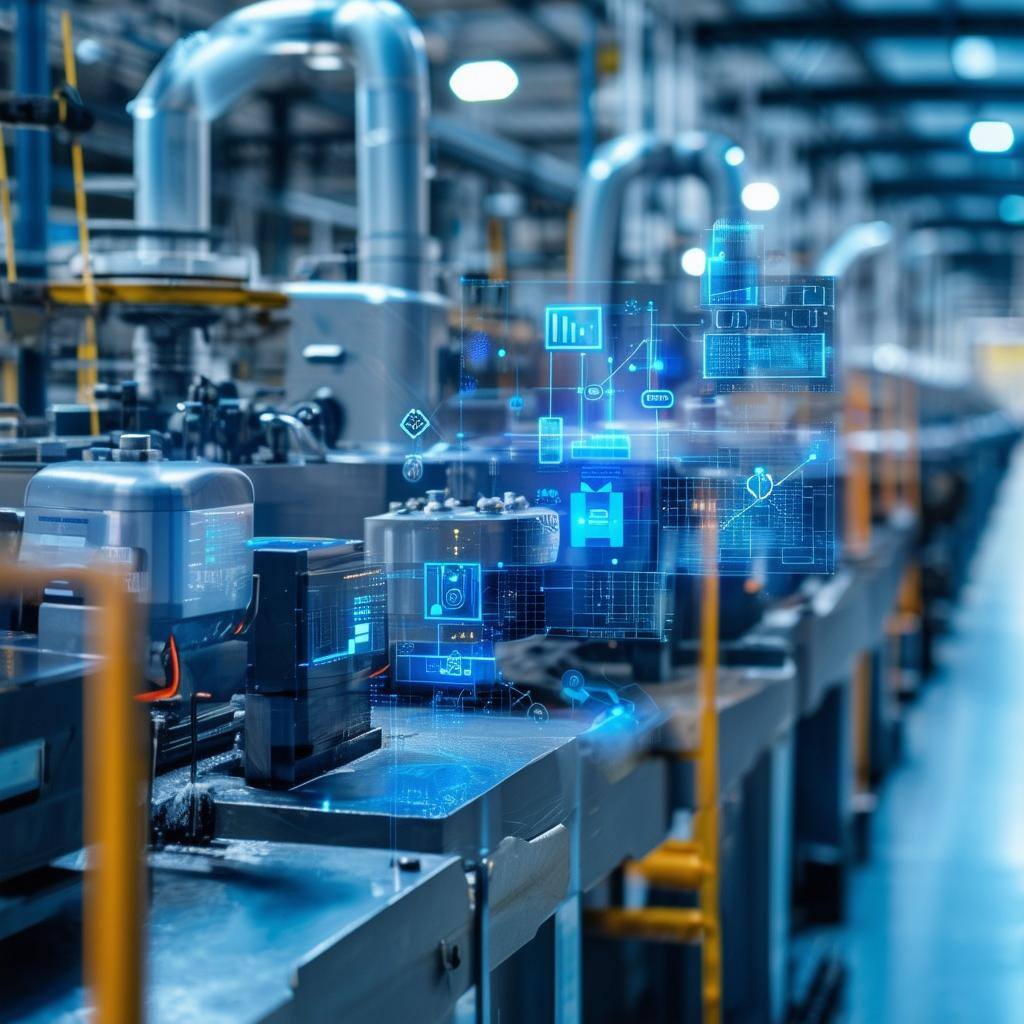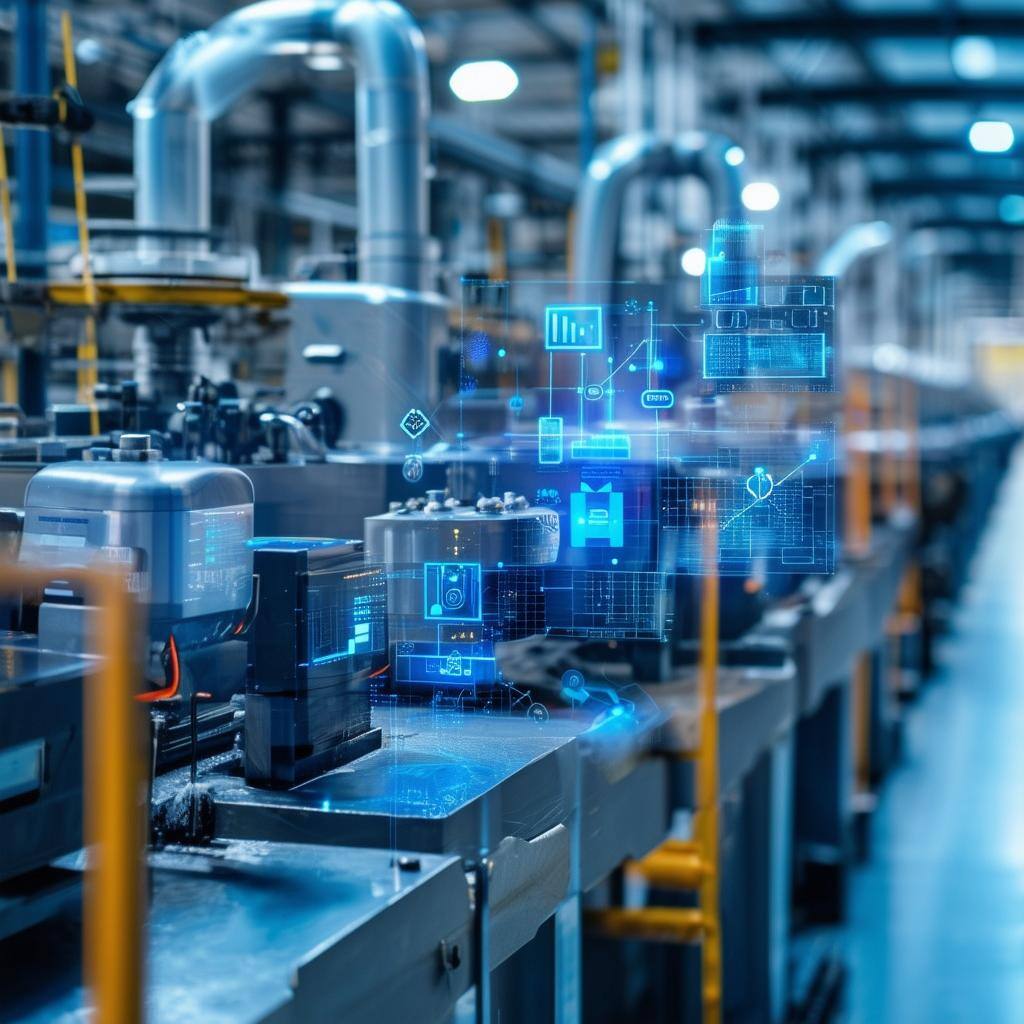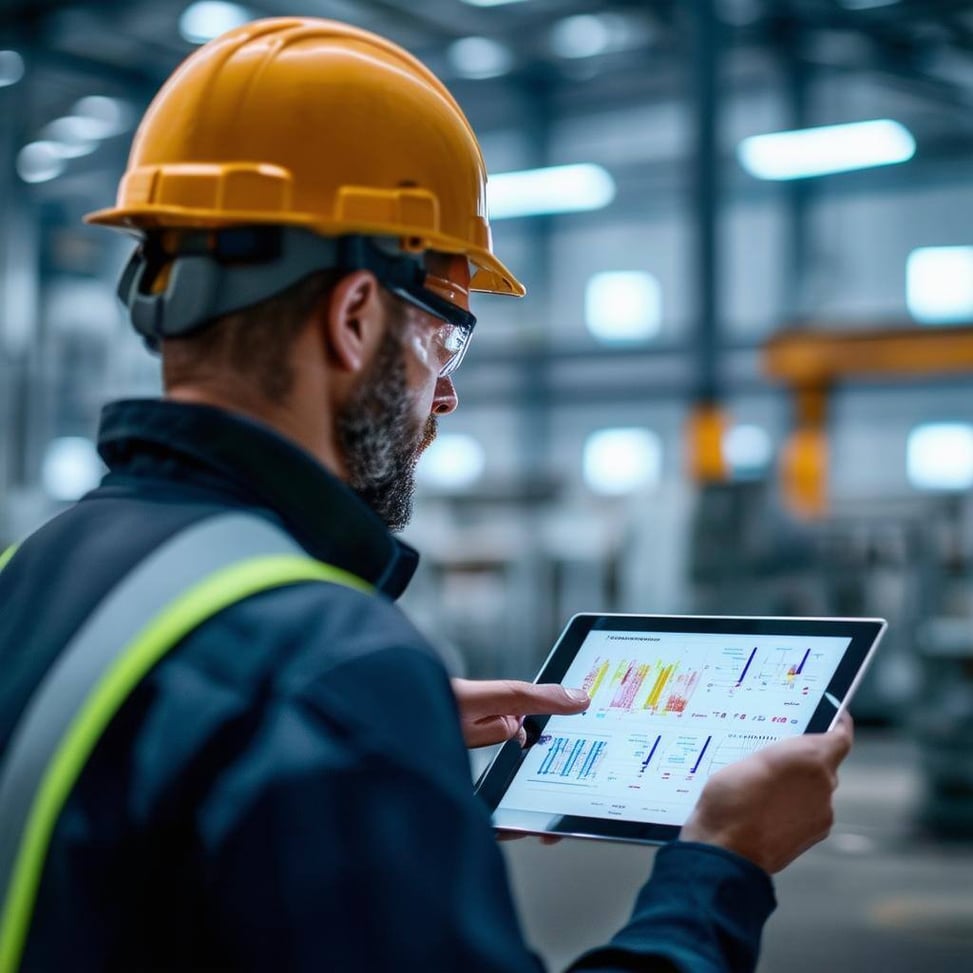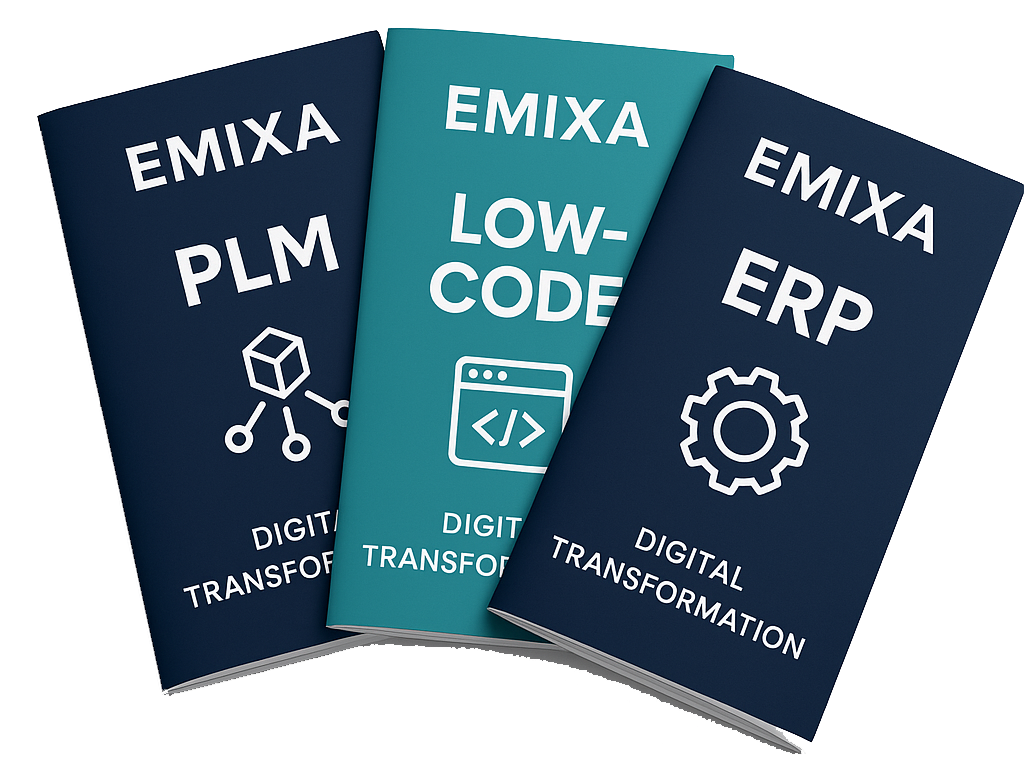Want to have grip on your OEE?
Streamline your OEE workflows with our MES solutions.


The Industrial Internet of Things (IIoT) is an advanced application of IoT technology designed specifically for the industry. In the context of Industry 4.0, the fourth industrial revolution, IIoT plays a crucial role. It enables the integration of physical and digital systems, resulting in smart factories. These factories offer personalised production processes and smooth cooperation between humans and machines. This allows companies to operate more flexibly and respond better to changing market needs.
Why is IIoT important and relevant to any manufacturing process?
As digitalisation accelerates and demand for flexibility and technological advancements grows, so does the role of IIoT in industrial companies. By digitising and automating processes, companies can stay competitive, gain real-time insight and manage their production lines more efficiently. This leads to improved operational performance.
Besides operational improvements, IIoT also offers benefits for the production process itself. For instance, Predictive maintenance enables continuous monitoring of machine data and predictive maintenance, preventing unexpected downtime and extending machine life. Moreover, IIoT optimises quality control by analysing data on production lines, allowing defects to be detected and corrected quickly. This contributes to stable and consistent production. These developments are in line with the findings of the World Economic Forum in their report "Industrial Internet of Things: Unleashing the Potential of Connected Products and Services," which identifies IIoT as a key technology for the future of manufacturing. The report highlights that IIoT not only increases productivity, but also enables new business models and promotes sustainability.
Technological innovations such as 5G, edge computing and AI reinforce these developments. They offer faster data processing, reliable connectivity and advanced analytics. On the supply chain front, the integration of IIoT allows companies to gain real-time insight into, for example, the movement of raw materials to finished goods. This leads to better inventory management, more efficient logistics and a more integrated production environment.
IIoT refers to the use of IoT technology in industrial applications. This involves connecting machines, sensors and devices. The connectivity enables the collection, exchange and analysis of data. Leading to improved productivity, efficiency and other economic benefits. IIoT puts a strong focus on machine-to-machine (M2M) communication, big data and machine learning, which ensures automation and optimisation of industrial processes.
To fully realise these benefits, it is important to effectively integrate IIoT data into existing business processes. This can be done through scalable integration platforms such as Boomi. Modern Enterprise Resource Planning, Product Lifecycle Management and Manufacturing Execution Systems help convert IIoT data into valuable optimisation layers. This allows companies to respond faster to changes and make strategic decisions.
Data-driven processes are crucial here, as they help identify inefficiencies and further optimise production processes. By supporting both Machine-to-People (M2P) and Machine-to-Machine (M2M) communication, By supporting both Machine-to-People (M2P) and Machine-to-Machine (M2M) communication, these systems streamline workflows and significantly boost production speed and efficiency. In addition, the integration of IIoT data makes it possible to automatically perform optimisation steps, such as planning predictive maintenance based on machine performance. The result is a data-driven approach that enables companies to intervene quickly and effectively when deviations occur, ensuring smooth and efficient operations.
IIoT goes beyond IoT because of its specific focus on industrial applications. It focuses on managing the complexity and precision required for industrial processes. While IoT is mainly focused with consumer applications, such as smart home appliances and wearables, IIoT uses advanced sensors, automation and monitoring tools. These tools are deployed to monitor and optimise critical parameters such as Overall Equipment Effectiveness (OEE) and First Pass Yield (FPY).
IIoT enhances collaboration between systems by connecting sensors, GPS locators and machines over a secure network. This allows data to be sent to cloud storage. This communication ensures that data from machines, hardware and applications is automatically available at the right time and place, significantly improving collaboration between systems. Through integrations and edge computing, applications can process this data and turn it into useful information. This is done by performing analyses, controlling machines or generating real-time alerts, for example when the temperature of a machine is too high and it threatens to fail. This prevents downtime of machines or production lines.
The processed information is then presented on a user interface, such as computers or tablets, giving employees easy access to analysed data. This allows them to make informed decisions based on the most up-to-date information. This enables companies to maximise operational efficiency, thanks to data-driven decisions and real-time monitoring of industrial processes. The result is a faster and more effective response to changes in the production environment.

The foundation of IIoT is Machine-to-Machine (M2M) communication. This technology allows devices and systems to communicate and exchange data with each other without human intervention. M2M uses a range of advanced protocols, such as Bluetooth, ModBus, Power Line Communication, M-Bus, Wireless M-Bus, 6LoWPAN, ZigBee and IEEE 802.15.4. These protocols enable devices in a network to collect, analyse and convert data into valuable information, which is then delivered to the right place. The result is a system-of-systems that can operate efficiently and autonomously.
The rise of Artificial Intelligence (AI) has further expanded the capabilities of M2M networks. AI provides advanced analytical capabilities that can process and interpret complex data. This allows devices in an M2M network not only to exchange data, but also to make logical decisions based on these analyses.These decisions can be shared in real-time within the network, which significantly increases the system's responsiveness and efficiency.
For devices and sensors to function effectively in IIoT environments, it is important that they are connected to the cloud. IIoT offers the flexibility to use different connectivity technologies without being limited to one specific method. Wireless connectivity such as Wi-Fi, Bluetooth, 5G, Zigbee, as well as wired connectivity such as Ethernet and Low Power Wide Area Network (LPWAN).
Choosing the right connectivity technology depends on factors such as range, bandwidth, power consumption and security requirements. In industrial environments, it is often necessary to combine multiple technologies to achieve optimal performance. By properly connecting IIoT systems, you can maximise the efficiency and productivity of industrial processes, while taking full advantage of the complexity and precision offered by IIoT.
Within a production facility, sensors play a crucial role in the IIoT network. These sensors monitor different types of data, such as environmental conditions, mechanical vibrations and product specifications. Monitoring these conditions is essential for ensuring the efficiency, quality and consistency of the production process, while preventing unwanted downtime or deviations. By using different types of IIoT sensors, a data stream can be generated. This data stream is monitored and analysed to make better decisions, contributing to the optimisation of production processes.
Industrial IoT sensors generate huge amounts of data that are transmitted to edge devices or edge gateways via communication protocols such as Modbus, Bluetooth and Wi-Fi. These devices play an important role in processing the collected data by performing initial filtering and transformation. This reduces the amount of data to be sent to central systems or the cloud, significantly speeding up processing time.
The filtered data that is further forwarded undergoes in-depth analyses that provide valuable insights for optimising production processes. In addition to filtering and transforming data, edge devices can also store data locally. This is especially essential during outages, as it ensures system continuity even when temporarily disconnected from the cloud or server.
Deep Learning and AI are indispensable technologies that help analyse this data. They enable companies to detect patterns and make predictions, leading to better optimisation of production processes. A good example of this is Predictive Maintenance. By continuously monitoring machine characteristics such as vibrations and temperature anomalies, maintenance can be scheduled before devices fail. This prevents downtime and production losses.

The increase of connected devices in IIoT brings not only benefits but also risks. Any device connected to the network can be a gateway for hackers. This can lead to data theft or manipulation of systems. Many IIoT devices are not designed with security as a priority and often lack modern protection measures. This makes them vulnerable to attack and increases risks within the manufacturing process, where unsecured software and insufficient network security can be critical targets.
Therefore, cybersecurity is becoming increasingly important, not only for the production process itself, but also for intercommunication between production sites. Companies need to invest in robust cybersecurity measures, such as network segmentation, encryption and regular updates to prevent attacks. In addition, the supply chain also requires extra attention to security. After all, vulnerabilities in the chain can affect the security of sensitive data and systems. It is therefore essential to implement a proactive cybersecurity strategy that protects not only the production process, but also the entire supply chain.
The adoption of IIoT continues to expand in diverse industrial settings, from agriculture and energy management to healthcare, transport and even the construction sector. It forms an essential part of a larger system in which machines, devices and sensors are connected via an integrated network. The integration of IIoT sensors with modern ERP, PLM and MES systems is key to achieving a data-driven manufacturing environment.
Smart Manufacturing uses advanced technologies such as AI and IIoT to improve production processes. Companies can collect and analyse real-time data, making production more efficient, improving quality and optimising equipment performance. This data-driven approach enables a more flexible response to changes in customer demand or market developments.
An important aspect of Smart Manufacturing is Smart Maintenance. By using IIoT data, companies can implement Predictive Maintenance, which identifies potential failures before they occur. This minimises unexpected downtime and reduces maintenance costs. One step further is Prescriptive Maintenance, which not only makes predictions but also recommends solutions based on analytics. IIoT thus provides the tools to transform maintenance from reactive to proactive, allowing operators to perform their jobs more efficiently and maximise operational output.
The integration of IIoT data into Manufacturing Execution Systems is becoming increasingly common. These systems use sensor data and machine data for OEE calculations and production dashboarding, among other things. This enables companies to monitor and make optimisations in real time, resulting in higher production output at lower costs.
Streamline your OEE workflows with our MES solutions.
Smart Logistics focuses on improving logistics processes through the use of IIoT systems. These systems collect data across the entire logistics chain, from warehouses to means of transport, and help companies design processes more efficiently and optimise operations. IIoT provides real-time visibility into the supply chain, which is essential for achieving Operational Excellence. For example, smart sensors monitor the location, temperature and condition of products during transport. In case of anomalies, companies can quickly intervene to reduce damage or prevent it entirely, leading to improved service and higher customer satisfaction.
Sustainability is an important topic for organisations, especially in the manufacturing industry. Smarter energy management plays an important role in minimising emissions while maximising production. By using smart sensors, organisations can gain real-time insight into energy consumption and identify any energy wastage. This allows actions to be taken or processes to be modified to avoid this waste, thereby reducing environmental impact.
Monitoring energy consumption is important to take proactive action. Many organisations experience challenges in bringing together all the information from IIoT systems, for example, into clear and well-organised dashboards. Using Mendix low-code, Emixa is able to build interface solutions and bring together information in one clear environment. This allows automated workflows to be activated to inform operators as soon as anomalies are detected. This also allows dynamic switching between different energy sources, such as solar or wind power, depending on availability and cost.
In addition to energy consumption, material flows can also be monitored, allowing production waste to be minimised. Manufacturers can use these insights to design more efficient production processes that require fewer raw materials, extend equipment lifetimes and optimise the integration of renewable energy sources.
Implementing IIoT in manufacturing and logistics is just the beginning. With rapid developments in AI and Machine Learning, the value of IIoT data will increase exponentially. Companies that embrace this trend can gain a strategic advantage over the competition. Emixa's Data & Analytics-team works on powerful data models that help clients get the most out of their data. This opens the door to a more efficient, flexible and sustainable future.

Implementing IIoT systems can be quite complex, especially when it comes to deciding where to start. Choosing technologies, integrating into existing systems and prioritising investments require a structured approach.
A good first step is to perform a quick scan on the current production process. Here, a Digital Maturity Assessment can be particularly valuable. This scan helps understand the current state of digitisation and identifies where improvements can be made. It provides a clear roadmap for smartly adopting IIoT solutions.
At Emixa, we understand that every company has unique challenges and opportunities, and we can support you in adopting IIoT systems through our expertise in management consulting, offering strategic advice to define a digital transformation vision and prioritise the adoption process. We also help with Data & Analytics solutions to extract valuable insights from real-time data, which is crucial for more efficient and sustainable manufacturing processes. Our application development focuses on creating customised applications for effectively managing and visualising IoT data, tailored to your organisation's needs. Finally, our integration services ensure that new IIoT solutions integrate seamlessly with existing systems, facilitating adoption and minimising operational disruptions.
Want to take the first step towards a smarter and more sustainable future? Contact us to find out how we can support you with a Digital Maturity Assessment and further implementation of IIoT solutions.
Author: Roel Kucukbiyik
Published date: August 26, 2025


We help businesses transform their digital future with cutting-edge technology and strategic products & services